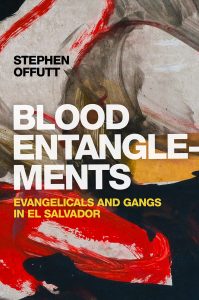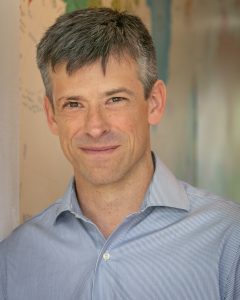In recent decades much of Latin America has seen a dramatic proliferation of two seemingly opposite groups: violent gangs and evangelical churches. In his new book Blood Entanglements (Oxford University Press), Stephen Offutt explores why evangelical congregations and gangs thrive in the same neighborhoods in El Salvador and how each side navigates their interaction—often in surprising ways.
In this interview, TPNRD Director Judd Birdsall asks Offutt about this complex relationship between evangelicals and gangs—and what we can learn from it about the broader interplay between religion and illicit groups.
Stephen Offutt is Associate Professor of Development Studies at Asbury Theological Seminary. His previous book was New Centers of Global Evangelicalism in Latin America and Africa (Cambridge University Press, 2015). In 2019 Offutt authored a TPNRD-commissioned policy report on Evangelicals and Governance in the Global South and presented it at a TPNRD conference in The Hague.
Judd Birdsall: At the outset of the book you mention that your research is based in part on direct engagement with numerous gang members. I assume this wasn’t your typical “participant-observer” research! What did your engagement look like? How did you gain access and trust? Did it help that you are a Christian and/or that you are not Salvadoran?
Stephen Offutt: My study had the trappings of standard qualitative research. Among other activities, I visited 24 churches, doing in depth work in one congregation and visiting three other churches regularly. I also visited the United States Embassy in El Salvador, Salvadoran government departments, offices of five NGOs, two youth detention centers, four local schools, a community health clinic, transportation posts, and several sites of employment and local entertainment. I spent time in the homes of people in the neighborhoods and met them and their families at local eateries. Finally, I followed the social and religious networks of people in these neighborhoods to other locations in El Salvador and conducted supplemental research in these other locations.
However, following standard research procedures in vulnerable settings does not necessarily result in quality data. If there is no trust, research subjects are not likely to be forthcoming on delicate topics such as the ones covered in this book.
Fortunately, I previously lived in El Salvador for almost three years. I maintained relationships I made at that time through regular visits and other forms of communication. Although I met new people during the course of my research, I was often able to reference mutual friends, especially as I spoke with evangelicals, and I was conversant in the “religious language” that they spoke, which further garnered trust. In this respect being a Christian was quite helpful.
The gang members I talked to were generally not in my pre-existing social networks. But I always visited them (whether in neighborhoods or prisons) with people who had built up trust with them over time, and I benefited by what one might call the transitive property of trust in those situations.
 Birdsall: It was fascinating to me that these Salvadoran gangs have a “morgue exception rule.” That is, you can only leave the gang by dying or by being born again. Does this rule apply equally to all religions (e.g. Catholicism) or are only converts to evangelicalism allowed to leave gangs?
Birdsall: It was fascinating to me that these Salvadoran gangs have a “morgue exception rule.” That is, you can only leave the gang by dying or by being born again. Does this rule apply equally to all religions (e.g. Catholicism) or are only converts to evangelicalism allowed to leave gangs?
Offutt: The morgue rule exception is almost exclusively extended to evangelical churches. Bob Brenneman has written extensively about this phenomenon. He explains the reason for this is that ascetic requirements of the evangelical faith tend to distinguish evangelicals from Catholics in Central America. Ascetic tendencies of evangelicals (no alcohol, tobacco, or going to bars or dance clubs, and certainly no drugs or violence) create important behavioral changes in youths who convert. Gang leaders both respect and monitor such changes. If a youth continues to live “la vida loca” after he is allowed to leave the gang, gang leaders may assume that the youth was faking conversion just to leave the gang. Such youths run the risk of being killed by their former gang.
Birdsall: Is there an understanding that Christian former gang members won’t fight against gangs or rat on them once they join the church?
Offutt: Yes, former gang members are watched especially closely by the gang. Like other community members, they must follow the rules established by the gangs who run their neighborhoods.
Birdsall: Are there lessons from the interaction between gangs and evangelicals in El Salvador generalizable to other countries, religions, and types of criminals?
Offutt: The lessons are generalizable in countries throughout most of Latin America, especially in those countries where gangs and evangelicals are plentiful. Details of course vary from country to country, but the main characteristics of the phenomenon can be seen throughout the region.
There are also strong indications that the findings are generalizable to interactions between Christians and gangs or other forms of organized violence in impoverished, urban communities around the world. I’ve run across examples that match my findings in places like Kenya, South Africa, and the Philippines.
Birdsall: One thing you address in the book is the rapid rise of Protestantism, particularly in its evangelical and Pentecostal expressions, in once solidly Catholic El Salvador–and throughout much of Latin America. It’s a complex story, but what are two or three salient factors that help explain the growth of Protestantism at the expense of Catholicism?
Offutt: There are several schools of thought regarding the growth of evangelicalism and Pentecostalism across the Global South. Scholars who chalk it up to American Imperialism note that when the global evangelical movement accelerated in the 1960s-1980s, several of its highest growth areas coincided with the hottest theatres of the Cold War. David Stoll, among others, noticed connections between U.S. political and military actors and evangelical religious organizations in Latin America during this time.
Other scholars have posited that Christianity’s growth in the Global South is generated by local trends and actors, not the West. They grounded their argument on two important premises. First, against all expectations, Christianity began to boom in Africa and Asia just as colonial powers were receding, perhaps indicating that Christianity had been crippled by the colonial presence instead of being dependent on it. Second, the upsurge in religious vitality continues in the Global South even as the West grows ever more secular and irreligious.
I count myself among a third group of scholars who create something of a synthesis between the two arguments just outlined. We note the independence, energy, and innovation that Global South actors have in creating their own religious realities. They are no one’s stooges, and certainly not the stooges of Western Christians. Such an observation does not negate the reality that religious ties between Global South Christians and the West were not severed in the post-colonial era. On the contrary, never before have Christians in the Global South been as transnationally mobile and connected as they are today. Global South actors are thus creating churches and other organizations by blending local initiative with religious (not political or military) resources they can access from the West and elsewhere.
Birdsall: A phrase that has recently caught my eye—and I’ve seen it in academic literature and government reports—is “evangelical gangs” in Latin America. It seems at first like a very strange juxtaposition, even an oxymoron. But the term suggests that there are gangs, namely drug trafficking rings, that draw some inspiration from evangelicalism and harbor a violent antipathy for Catholicism and especially for Afro-Brazilian spiritual traditions. Is “evangelical gang” a misnomer or a helpful term?
Offutt: I have seen press reports about this Brazilian dynamic, which has subtle but crucial differences from the Salvadoran situation. In El Salvador, my research uncovered gang members who come from evangelical homes and maintain evangelical beliefs. But their gang identity is distinct from, and in tension with, their understanding of what it means to follow God. In contrast, the press reports from Brazil indicate that a gang in at least a few neighborhoods expresses its evangelical identity in part by engaging in violent acts against other faith traditions. More academic research may be needed to know if such dynamics are widespread or if they are highly localized. Andrew Johnson, a social scientist and author of If I Give My Soul: Faith Behind Bars in Rio de Janeiro (Oxford University Press 2017), studied evangelicals and gangs in Brazil. He did not emphasize “evangelical gangs” in his book. Perhaps he completed his research shortly before “evangelical gangs” emerged. I have not heard about “evangelical gangs” outside of Brazil.
Birdsall: Here again I wonder if there are some lessons from “evangelical gangs” that can help us reflect on how we conceptualize and talk about other religiously inspired illicit/violent groups such as “Muslim terrorists.”
Offutt: Tom Phillips’ article last year in the Guardian regarding “evangelical gangs,” or, in his words, “narco-Pentecostals,” in Brazil noted that some in the neighborhood controlled by this group believed their lives had improved because the gang brought order to their communities. This included, among other things keeping the streets clean and doing acts of charity for those in need.
Likewise, in my book I talk about how gang leaders and pastors create unusual alliances of governance in communities where the state has failed.

Stephen Offutt
Again, there are differences between the Salvadoran and Brazilian cases, but the common thread is that people in ungoverned or misgoverned communities cannot pretend that the state has monopolized the use of force and is performing the duties it is intended to perform. Their lived reality is that other actors fill those roles, and they thus must engage with those actors.
Religious leaders often have clout in such places. Like other community members, they eschew the premise that they should only deal with a non-existent state. Instead, they build relationships and seek to influence the gang leaders who are actually governing communities. It is possible that in other parts of the world, such practicalities bring leaders of other religions and leaders of other illicit groups together in communities that are, for whatever reason, also beyond the reach of the state. Seen in this light, ties between religious actors and entities that wield hard power in communities becomes somewhat less scandalous. These are mostly poor people who are trying to navigate highly complex moral realities.
Sometimes states try to re-establish their power over communities and illicit actors. In El Salvador, the government began a mass incarceration strategy as I was finishing the research for my book. They have now put over 60,000 people in prison in the last 18 months, including numerous pastors and tens of thousands of youths from evangelical homes. The initiative is popular among Salvadoran residents, even as there are serious concerns about human rights, due process violations, and the dismantling of democratic institutions.
Consequently, El Salvador’s social and religious context is rapidly changing. It remains to be seen how relationships evolve between evangelicals and gangs in communities and in prisons. The evolution of the relationship between evangelicals and the newly active state also bears watching. Some champions of democracy hope that evangelicals will fight against the Bukele administration, even as they look askance at overly friendly evangelical relationships with gangs. It is a tricky spot for a religious group that thrives in communities with bad schools, poor health services, and scarce economic resources. Expectations should be tempered by such realities.